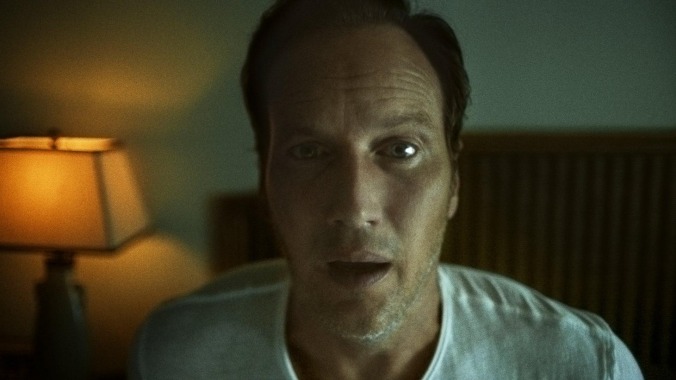Insidious: The Red Door review: Patrick Wilson fails to deliver fresh scares
The horror icon’s directorial debut suffers from a script that doesn't seem to understand the franchise

After seeing Insidious: The Red Door, it’s hard not to feel a bit sorry for Patrick Wilson. It would be an unenviable task for anyone to take the directorial reins of a franchise from modern horror legends James Wan and Leigh Whannell—much less make it his directorial debut—but The Red Door is such a wrong-headed attempt to keep the Insidious franchise alive that it almost feels like a meandering fan fiction past its prime. Featuring a co-story credit from Whannell, the screenplay by Scott Teems (Halloween Kills) is a weak re-interpretation of the Lambert family’s struggles as bland trauma horror, and Wilson’s baseline competence as a director does nothing to elevate the material.
Set nine years after the events of Chapter 2, The Red Door finds Josh Lambert (Wilson) and his now adult son Dalton (Ty Simpkins) in a coolly antagonistic relationship for which neither can fully identify the cause. As Dalton starts a new life in college as a burgeoning artist, he accidentally uncovers repressed memories of a red door, which he starts to paint in further detail as haunting ghostly visitations make him question his sanity. Meanwhile, Josh undergoes a parallel journey through his failing memory, confronting buried traumas that break the barriers between the living and the dead.
Insidious fans should already be aware of the experiences that underpin Josh and Dalton’s spiritual reawakening and the treatment they underwent to suppress their memories and their astral projecting abilities, so it’s an odd choice to develop a plot entirely around these characters discovering something the audience already knows. Until now, each chapter of this series was a paranormal investigation that gradually expanded the franchise’s mythology with a streak of self-aware deprecation. The Red Door feels content to retread the same iconography with the same demonic antagonist; it’s superficially reverent to its forebears but it fails to contribute anything worthwhile or new to its canon.
Instead, the film is intent on pretending to explore that all-consuming bugbear of modern horror; generational trauma. It would be one thing to take the franchise in an inspired new direction, but the conflation of the Lambert family’s psychic gifts with the ways in which mentally ill family members hurt one another has become such a tired trope in the possession horror subgenre that the dead horse is not only beaten to a pulp, its spirit can’t be bothered for an intimidating neigh. The Red Door makes a vague gesture in the direction of emotional resonance, but it can’t figure out what to do with its allegory beyond what’s been done before and more successfully elsewhere, flimsily mimicking Ari Aster with all the conviction of Neil LaBute.
























![Rob Reiner's son booked for murder amid homicide investigation [Updated]](https://img.pastemagazine.com/wp-content/avuploads/2025/12/15131025/MixCollage-15-Dec-2025-01-10-PM-9121.jpg)















